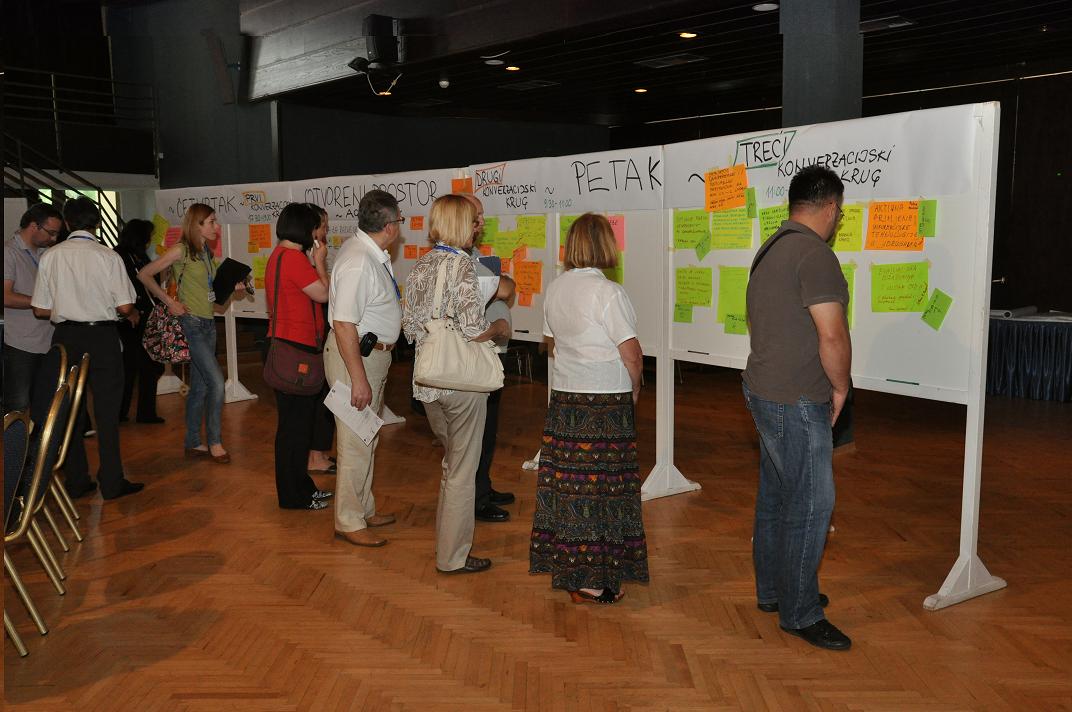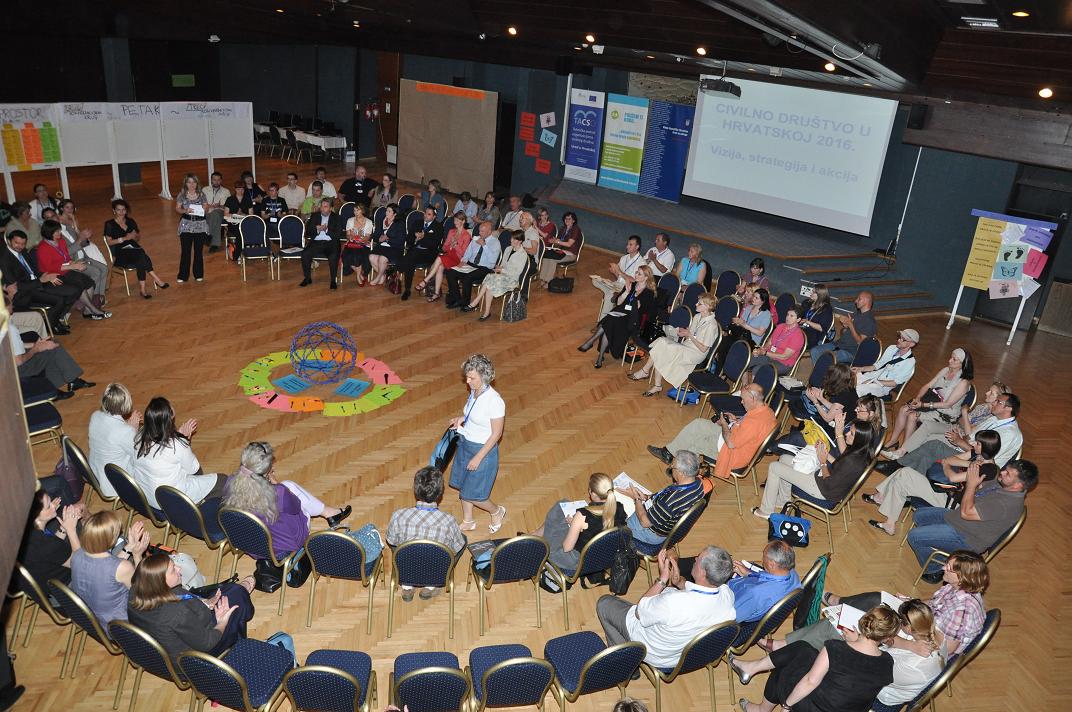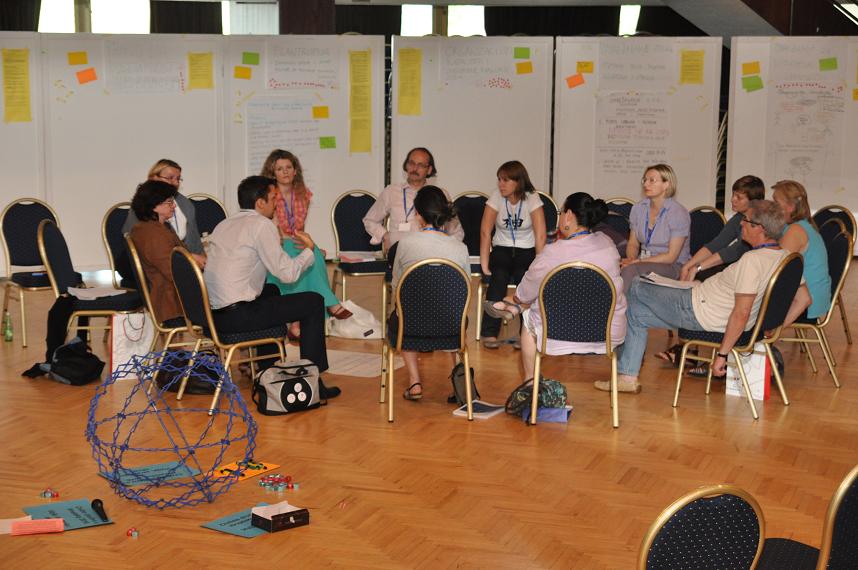- Published: 04.07.2011.
NGO Days 2011 - Report
This year's NGO Days have been organized by the Office for Cooperation with NGOs of the Government of the Republic of Croatia in cooperation with TACSO (Office for Technical Assistance for Civil Society Organisations) and the Foundation for Partnership and Civil Society Development and took place at the Hotel Histria in Pula from 26th to 28th May 2011. 
The overall theme of NGO Days 2011 was Civil Society in Croatia in 2016 – visions, strategies and actions. The main purpose was to articulate vision of civil society development in Croatia and so to contribute to the the creation of the first draft of the National Strategy and the Action Plan for the period from 2012 to 2016.
The participants of the NGO Days 2011 were welcomed by Ivan Jakovčić, Istria County Prefect, Erol Akdag on behalf of the Delegation of the European Union to the Republic of Croatia and Zrinka Vrabec Mojzeš, who represented the Office of the President of Croatia.
NGO Days 2011 conference structure was based on Open Space Technology without pre-determined agenda, only the highly interactive framework. This framework was not intended to tell people what to do and when. It made possible to create a supportive environment in which all the participants of NGO Days 2011, citizens’ associations and other civil society organizations, as well as representatives of public administration bodies, actively participated and gave their contribution to the vision of civil society development in Croatia. The Open Space conference in Pula was hosted by facilitators Martina Stažnik and Miljenka Plazonić Bogdan.
How did it work?
When participants of the NGO Days 2011 arrived to the conference hall they immediately knew that this is not going to be an ordinary meeting. The group of over hundred participants convened in three large concentric circles, facing each other and close to the agenda wall. They have been welcomed by Mr. Igor Vidačak and Ms. Aida Bagić, who briefly gave the context for the Open Space theme - the need for CSO representatives to take an active role in preparing new national strategy on creating an enabling environment for civil society development in Croatia.

The facilitators, Martina Stažnik and Miljenka Plazonić Bogdan, provided an overview of the process and explained Open Space four principles and one law.
The four principles are:
1) Whoever comes is the right person.
2) Whatever happens is the only thing that could have happened.
3) Whenever it starts is the right time.
4) When it is over it is over.
2) Whatever happens is the only thing that could have happened.
3) Whenever it starts is the right time.
4) When it is over it is over.
One of the favorite Open Space principle is The Law of Two Feet: "If you find yourself in a situation where you aren't learning or contributing, go somewhere else." This includes the possibility of moving to another level of awareness and participation, as well as the more obvious one of moving to another activity. This law causes some participants to flit from activity to activity. We call such people bumblebees because they cross-pollinate all the workshops. Some participants who use The Law of Two Feet to go off and sit by themselves we call butterflies, because they create quiet centers of non-action for stillness, beauty, novelty or random conversations to be born.
After that facilitators invited participants with issues of concern (articulation of their vision of civil society in Croatia in next five years) to come into the circle, write the issue on a piece of paper and announce it to the group. Each convener placed his or her paper on the wall and suggested a time and a place to meet. This process continued until there were no more agenda items. For the three working sessions, conveners announced 22 issues to be discussed (1st 8 themes, 2nd 7 themes and 3rd 7 themes). That way the agenda was formed for the first day and the morning of second day.
Issues addressed included the following: democratic citizenship, philanthropy, standards for provision of social services, international development assistance, organizational quality assurance standards, youth business development, free access to information, civil society organization’s networking and partnership, legal status of CSOs, hour bank, membership of CSOs in international organizations, decentralization, citizens’ chamber of commerce, development of volunteerism, role of media in civil society development, public financing of CSO’s, evaluation, self-employment of youth, IT applications in CSOs, public and CSOs partnerships, social entrepreneurship, role of local and regional governments in civil society development.
Then the group dissolved and individual participants headed to the agenda wall, by now covered with proposals for a variety of sessions. Participants signed up for sessions they were interested in, as if in a kind of market place.
Working sessions have been convened during the first day in the afternoon and second day of the workshop during the morning. Sessions ran in parallel and involved only those most deeply concerned. Recorders, determined by each group, captured the most important points and posted the reports on the news wall with support of two volunteers who were managing the Conference Office placed in a corner of the conference room.

All of these reports were also presented visually on flip chart papers and were posted on the walls (called Gallery) around the concentric circles as they were produced by the small groups. Each report hanged on the walls, providing an ongoing, real-time record of the discussions process that took the issues that have been discussed to the strategic plans.
Following a break for lunch on the second day, the group moved into convergence “walk around” the Gallery, participants were given little sticky spots and they “voted” for the issues that they find important for future development. Then they have been invited to choose one topic the want to develop further in next strategy planning session. Participants selected following 10 themes to develop during the event:
-the role of the media in civil society development,
-legal status of organizations for public good,
-self-employment,
-development of volunteerism,
-quality assurance of CSOs,
-quality standards for delivering social services,
-social entrepreneurship,
-public financing of CSOs,
-democratic citizenships,
-decentralization and development of regional and local foundations.
The conference concluded with brief presentations from each of the 10 working sessions. Everyone was encouraged to contribute to a learning exchange, so that the whole group could learn. After presentations, participants were invited to share comments, insights and commitments arising from the process. Collective proceedings of all the working sessions were prepared at the end of conference (in form of memory stick that contained participants’ list, all session reports and photos of the event) for each participant by the facilitators and volunteers with assistance of the organisers.
In the Open Space event, there's a group rhythm similar to breathing: breathing in when the whole circle comes together, breathing out when the whole circle breaks up and forms smaller circles in the marketplace) and then again breathing in (the whole circle comes back together). That breathing rhythm exists over time in organizations and communities, and NGO Days 2011 was a great opportunity to breathe in, connect and get a common understanding on what is important for civil society in Croatia.